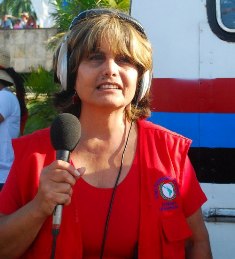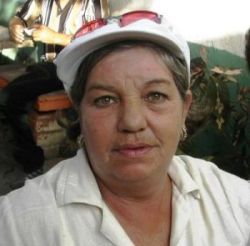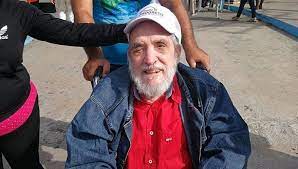That sparked off never-ending laughter in some students; the teacher had to expel three students from the class to continue the lesson. “There was an incredible lack of communication”, retells Dalia Reyes, who has been able to combine the daily work of journalism in the CMHW based in Villa Clara with the teaching profession in the “Marta Abreu” Central University from Las Villas (UCLV) eveen without teaching experience.
Full of tenderness and that patience the flowers named like her inspire, Dalia finds in the humorous character of youth and in the express desire of teaching the new generation of journalists, the magic of the radio. In order to know the bonds between them, the environment and the university, we talk today with this prize winning journalist and teacher.
“The CMHW has always been the media most open to students, at least here in the central region of Cuba, where they train to have a degree in Journalism, not only the kids from Villa Clara, but also those from Sancti Spiritus and Cienfuegos”, says Dalia.
“Even so, I cannot deny the existence of a certain reluctance of the academy towards the radio, because some of those just graduated choose television or the written press instead believing that this is the ideal media to elevate the profession. We have been able to dismiss that belief showing several ways to approach it, that’s why the three teachers of us decided to deliver the lessons.”
Do you consider this radio-college approach achieved by the teachers of radio Journalism in the UCLV is produced as a result of the way in which the subject is delivered?
Yes, of course. They fall in love with the media. That’s an achievement of our team. We have noticed it because still when they have concluded their practice, after some years, they keep helping us in the news spots of the radio station. Of course, some can do that, and others can’t because of the dynamics of the studio and the evaluations.
This didn’t happen in my generation. When we graduated we wanted to work for the press or specialized magazines. That means an important step the radio made during the special period in Cuba where its true importance was proven, above all in exceptional situations, accidents, climate phenomena, and so on. That immediacy is the bait for many to choose waves and microphones.
Something really troubling is the fact that many in love with the media after graduating, their Diploma Papers have nothing to do with the radio. Why? I think the media should demand more in their bank of problems and interests of research and get them to the students.
 But it’s been ten years since this degree course was founded. There’s no thesis related to the radio? In what way has the media been enriched from that research?
But it’s been ten years since this degree course was founded. There’s no thesis related to the radio? In what way has the media been enriched from that research?
Yes, but not all that do we need. This year the department will direct the themes to be researched by the students. That will be a step forward. And about the second question, that’s another problem we have. When debates around a thesis are over, none of the tools proposed to improve the work are used. I am talking about things required for the press like the studies on reception.
Those studies do not go beyond the doors of College. The managers of the media from the Association of Cuban Journalists (UPEC in Spanish) in Havana and reporters and correspondents from the rest of the provinces do not attend the thesis discussions. Those research works diagnose problems and provide solutions which can be assessed.
I’ve heard that the University has a Radio Base, which has even won many prizes in the National Festivals of University Radio. How much does it provide for the development of the subject itself?
Certainly it is a way of practicing what they learn in class, but it has many gaps. The university has not assumed that this space should be run and led by the students. We have faced some problems on that. The university extension department has not understood that they can spread, through that media, their pre-professional practice and take on all the responsibility of a radio station.
In the subject you teach many journalistic techniques which go from how to make a lead with the five classic questions of journalism to the basic structure to conceive a radio report. Is that bad for the students’ creativity?
I think it is not. The academy offers the theory to be enriched through everyone’s experience. The most important is that they can have the main tools for good radio, because the style and the way of doing it is acquired through the years.
In class we talk about the voice, the music, the effects, and a module of every journalistic branch, but also radio drama, and how to design the news or a magazine. I don’t see any contradiction between theory and creativity because they have to prove it in every final work they hand in at the end of the semester.
I am happy with the way in which the subject is taught, above all, because the students get the command of the radio language. They have even talked in different meetings about the need for increasing the hours per lesson in the basic subjects of the profession, among them radio journalism.
The self-training and experience, will give them other tools. When they finish their professional practice and go to radio stations in every province of residence the reports they make are entirely published, and this confirms the idea that they end up ready to work on the radio.
How do you feel when you hear one of your students’ name in the credits?
I feel complete as a professional. The same as in graduations. It’s a privilege for a teacher, although I don’t consider myself as such, I am just a journalist of some experience that tries to hand down to the students her knowledge and love for the media. That’s the moment to stop and say: Sugar! I sowed something.
This has forced me to do my job better and be an example for them, not only as a professional, but also as a human being. They count on you for other things, as a teacher, as a mother or even as a paradigm.
How do you assess the new generation of journalists in Villa Clara, above all those who choose the radio?
I think the youth nowadays is not the one of my times. We are living amid other conditions in the country; they have many concerns, doubts, questions with no or only partialanswers. There is still much work to be done on political maturity and commitment with the media.
The current times are very harsh. And they are not oblivious to the limitations and shortages we have. This is a complex profession. They are our relievers, so we have to work so they embrace this job the same way we did.
I think they are the very best of our youth, even when they are not perfect. They have intelligence, interest and drive for work, since they respond to every call. What we have to do is to teach the nice things this job has, to make them better professionals, better people and better Cubans.
Translated by ESTI




